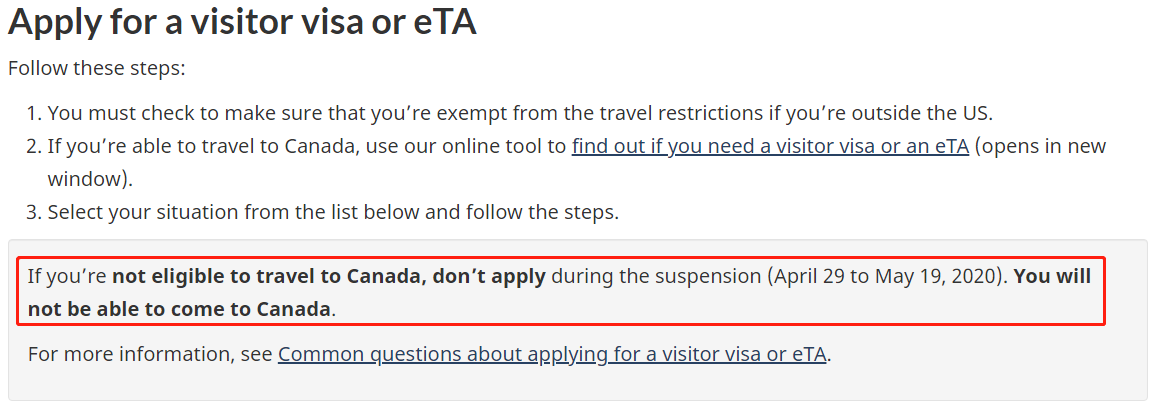Scan


The Canadian federal government Immigration, Refugees and Citizenship Canada (IRCC) released the latest policy on visa processing, covering a variety of temporary visa categories including visitor visas, study permits, and work permits. Now ECanadaSchool takes you to have a look.
Visitor visa application
If you’re not eligible to travel to Canada, don’t apply during the suspension (April 29 to May 19, 2020). You will not be able to come to Canada.

Who can enter Canada
You can travel to and may be permitted to enter Canada if you’re a
Canadian citizen
Canadian permanent resident
person registered under Canada’s Indian Act
protected person
foreign national who is coming for an essential (non-discretionary) purpose from the United States (U.S.)
foreign national who is coming for an essential (non-discretionary) purpose from a country other than the U.S. and are exempt from the travel restrictions (see Exemptions to the travel restrictions for more information)
Exemptions to the travel restrictions
The following people may travel to Canada for an essential (non-discretionary) purpose from a country other than the U.S.:
temporary foreign workers
some international students
some approved permanent residents
immediate family members of a Canadian citizen or Canadian permanent resident (see below for more information)
immediate family members with written authorization from the Government of Canada to reunite with a family member living temporarily in Canada (see below for more information)
transiting passengers (must remain in a Canadian airport to complete their connection)
members of the Canadian forces, visiting forces, Department of National Defence and their immediate family members
accredited diplomats and immediate family members (includes North Atlantic Treaty Organization [NATO], those under the United Nations Headquarters Agreement, other organizations)
air and marine crew members
French citizens who live in Saint-Pierre and Miquelon and have been in only Canada, the U.S. or Saint-Pierre and Miquelon during the 14 days before the day they seek to enter Canada
any person who does not pose a significant harm to public health, in the opinion of the Chief Public Health Officer of Canada, and who will provide an essential service while in Canada
any person whose presence in Canada is in the national interest, in the opinion of the Minister of Immigration, Refugees and Citizenship; Public Safety and Emergency Preparedness; or Foreign Affairs
any person who is coming at the invitation of the Minister of Health for the purpose of COVID-19 assistance
any person whose purpose is to make medical deliveries
An immediate family member is defined as a
spouse or common-law partner
dependent child
dependent child of a dependent child
parent or step-parent
guardian or tutor
Study permit or work permit application
If you’re applying for a study permit or work permit from outside Canada during the suspension, you must apply online.

Once your application is processed and approved, all temporary foreign workers and some international students (often indicate those students whose study permit are approved before or on March 18, 2020) can travel to Canada for an essential (non-discretionary) purpose.
Before you travel
Before travelling to Canada, make sure you have what you need to show you’re exempt from the travel restrictions, if you’re outside the US, and evidence that you’re travelling for an essentialFootnote1 (non-discretionary) purpose.
If you’re a student, you must bring a valid study permit or a port of entry letter of introduction that shows that you were approved for a study permit before or on March 18, 2020
If you’re a temporary foreign worker, you must bring a valid work permit or a port of entry letter of introduction that shows you’re approved for a work permit
Many non-essential businesses in Canada are closed or are operating with limited staff. If you have a job with a specific employer, check that the job you’ve been hired for is still available. If you have an open work permit, it may be difficult to find a job.
Airline officials will be conducting a health check, and anyone showing symptoms of COVID-19 will not be able to board their flight to Canada.
When you arrive in Canada
Your health needs to be assessed before you leave the airport.
You must have a plan to quarantine for 14 days when you arrive in Canada. This is mandatory, even if you have no symptoms. If you don’t have a plan, you should not travel to Canada.
Essential purposes
Some examples of essential travel purposes are:
work and study
critical infrastructure support
economic services and supply chains
shopping for essential goods, such as:
medication
items necessary for the health and safety of an individual or family
health, immediate medical care, safety and security
Examples of discretionary/ optional (non-essential) travel include:
tourism
recreation
entertainment
Please feel free to contact ECanadaSchool if you want to consult anyting about study in Canada.